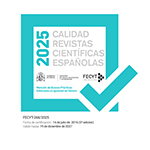The recreation of the warrior: The transformation of the Francoist veterans’ masculinity (1939-1965)
Abstract
The establishment of the Franco regime entailed the consolidation of a set of ultra-conservative, Catholic, and fascist gender roles, as well as masculinity ideals. However, Francoist masculinity has been largely neglected by historians. This article examines the historical evolution of Francoist war veterans as a manly archetype. The article argues that this ideal of masculinity was hegemonic during most part of the dictatorship. By analysing journalistic, literary and filmic sources, and by observing the intimate and familiar dimension of the lives of men who fought and won the Spanish Civil War, the article explains the implications and transformations of such manly ideal, which drew on the driving notion of the “recreation of the warrior”. A mythical conception of the man as a war-experienced individual preserved its hegemony by fusing with other masculinity models, thus becoming a key factor to sustain social and familiar order and gender relations in Spanish society until the mid-1960s.Downloads
Article download
License
Aquellos autores/as que tengan publicaciones con esta revista, aceptan los términos siguientes:
a. Los autores/as conservarán sus derechos de autor y garantizarán a la revista el derecho de primera publicación de su obra, el cuál estará simultáneamente sujeto a la Licencia de reconocimiento de Creative Commons Reconocimiento-No comercial-Sin obra derivada 4.0 España que permite a terceros compartir la obra siempre que se indique su autor y su primera publicación esta revista.
b. Los autores/as podrán adoptar otros acuerdos de licencia no exclusiva de distribución de la versión de la obra publicada (p. ej.: depositarla en un archivo telemático institucional o publicarla en un volumen monográfico) siempre que se indique la publicación inicial en esta revista.
Plagio y fraude científico
La publicación de un trabajo que atente contra los derechos de propiedad intelectual será responsabilidad de los autores/as, que serán los que asuman los conflictos que pudieran tener lugar por razones de derechos de autor. Los conflictos más importantes pueden darse por la comisión de plagios y fraudes científicos.
Se entiende por plagio:
1.Presentar el trabajo ajeno como propio.
2.Adoptar palabras o ideas de otros autores sin el debido reconocimiento.
3.No emplear las comillas u otro formato distintivo en una cita literal.
4.Dar información incorrecta sobre la verdadera fuente de una cita.
5.El parafraseo de una fuente sin mencionar la fuente.
6.El parafraseo abusivo, incluso si se menciona la fuente.
Las prácticas constitutivas de fraude científico son las siguientes:
1.Fabricación, falsificación u omisión de datos y plagio.
2.Publicación duplicada.
3.Conflictos de autoría.












